The Best 10 Alternatives to NextDNS (+ Pricing & Reviews)
Twingate Team
•
Jul 10, 2024

NextDNS is a modern firewall solution that protects users from security threats, blocks ads and trackers, and provides parental controls across all devices and networks. While it offers robust features, it may not be suitable for everyone due to its technical setup requirements. This article explores how Twingate enhances secure access for distributed workforces.
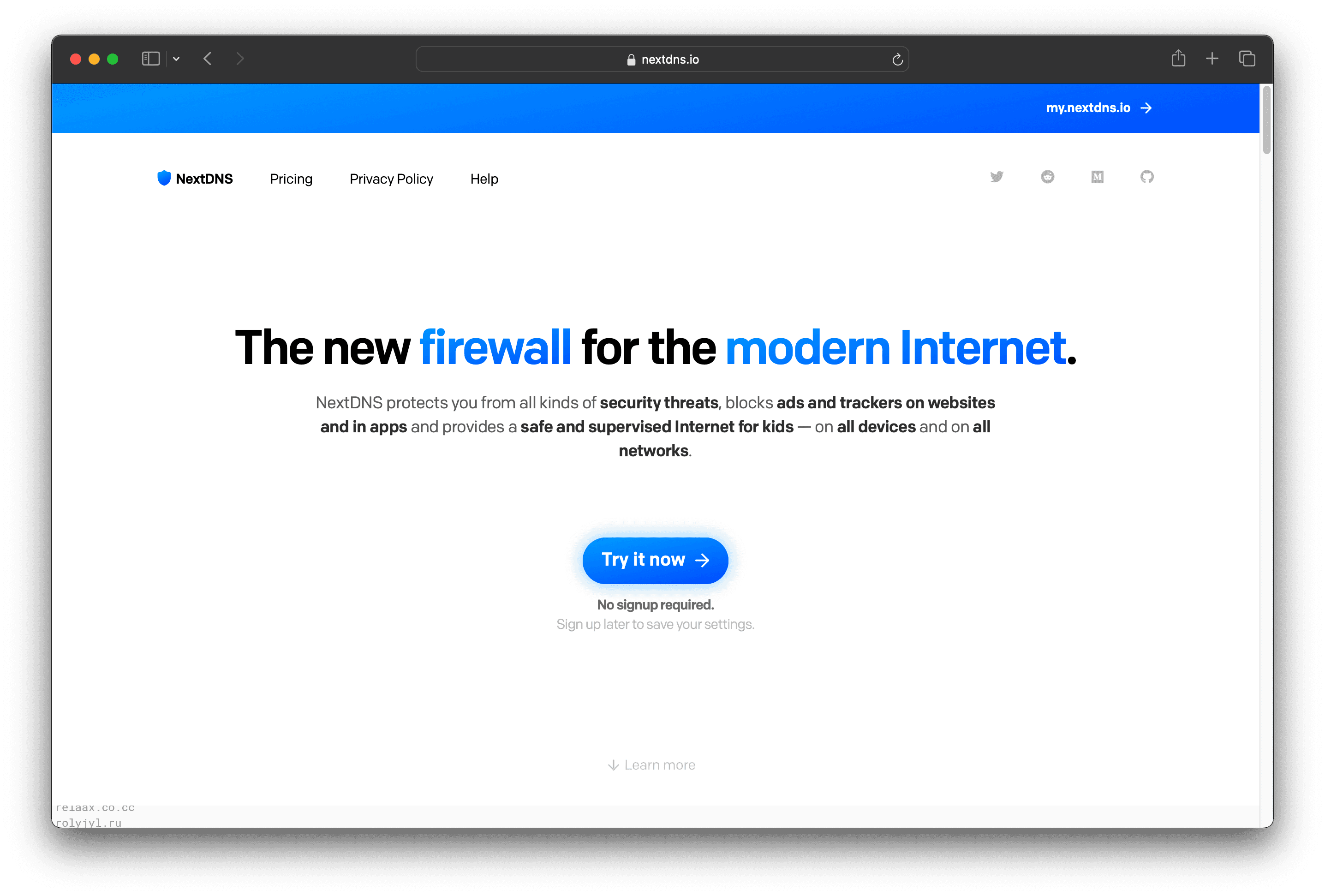
10 Alternatives to NextDNS
1. Twingate
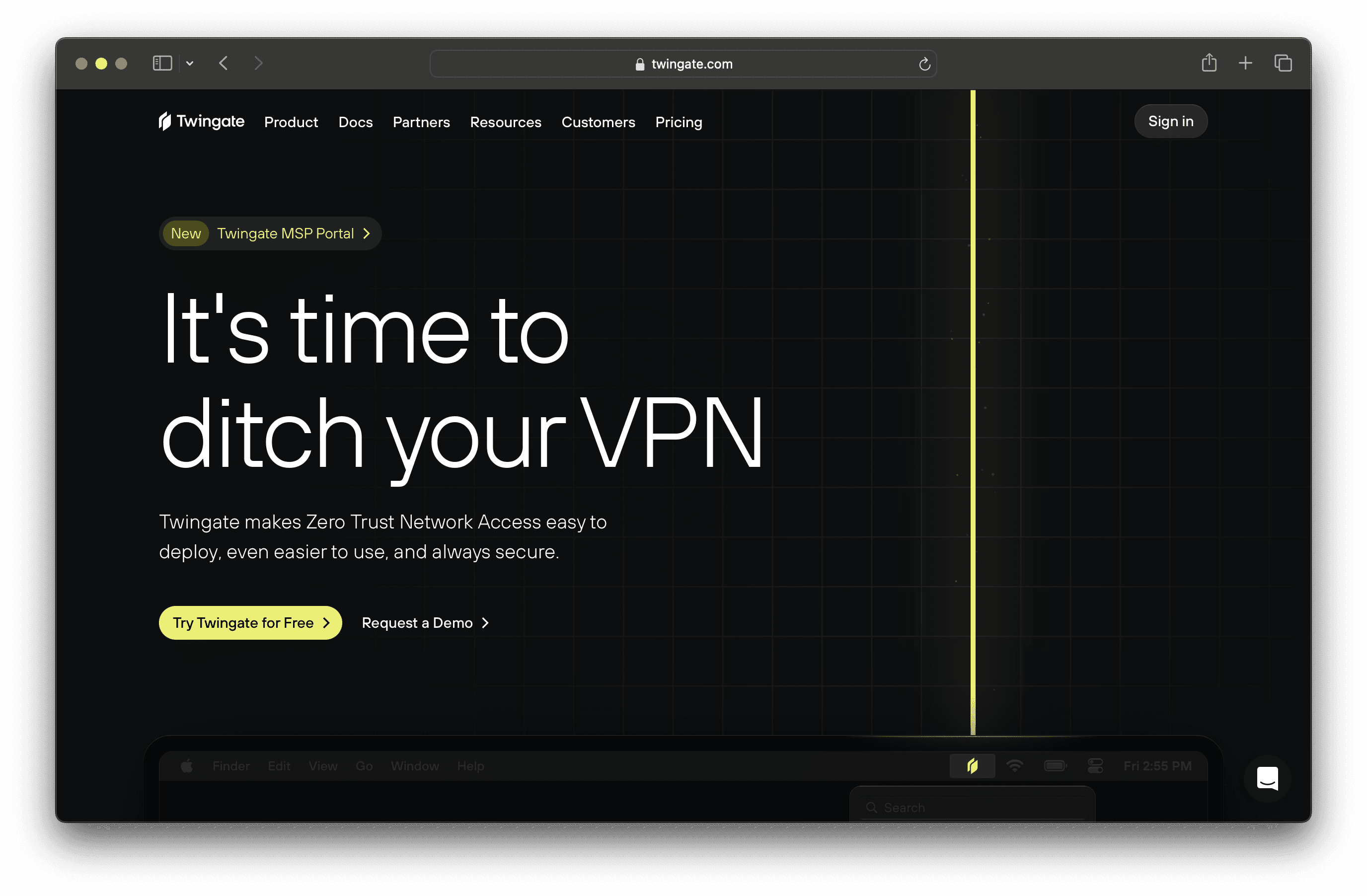
Twingate is a network security solution designed to replace traditional VPNs for remote access, offering a zero-trust security model and seamless deployment alongside existing infrastructure. With a focus on ease of use and scalability, Twingate aims to provide a secure and maintainable solution for businesses of all sizes.
Twingate Pricing
Starter: Free per user/month
Teams: $6 per user/month (monthly), $5 per user/month (yearly)
Business: $12 per user/month (monthly), $10 per user/month (yearly)
Enterprise: Custom pricing per user/month
Twingate Reviews
Twingate has an overall rating of 4.7 out of 5 stars based on 63 reviews. Users praise its ease of setup and high security. Check out more of our reviews here!
Pros and Cons of Twingate
Pros:
Seamless integration with existing infrastructure, making it easy to deploy without disrupting current systems.
Zero trust security model ensures that every access request is verified, enhancing overall security.
Highly rated for ease of setup, allowing teams to get started quickly without extensive technical knowledge.
Cons:
Some users report performance issues, particularly in high-traffic environments, which can affect productivity.
Limited customization options may not meet the specific needs of all organizations.
Logging issues have been noted, making it difficult to track and audit access requests effectively.
2. Webroot
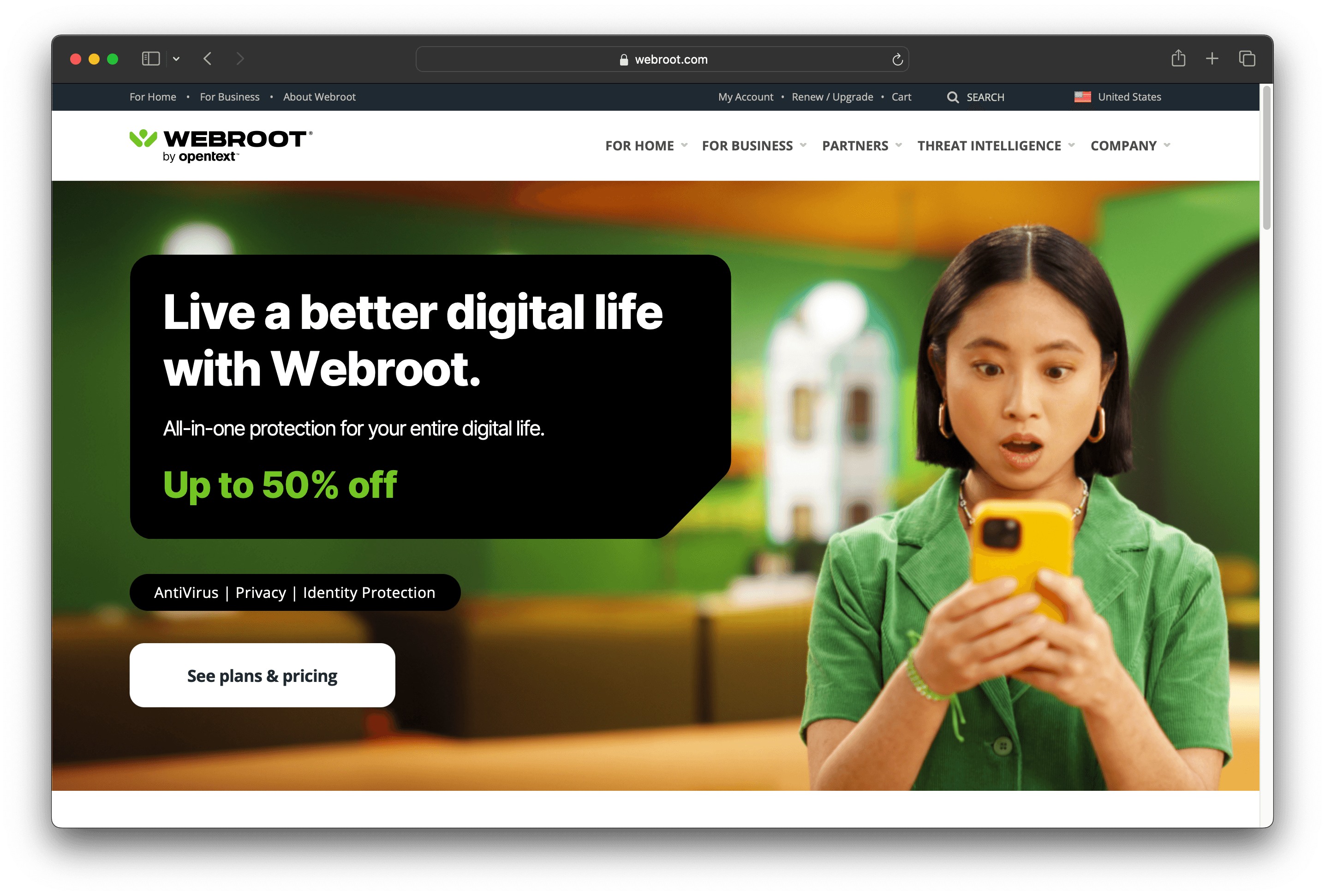
Webroot is a cybersecurity solution designed to protect against malware, phishing, and other online threats. It offers real-time protection, cloud-based management, and easy deployment. With a focus on both home and business users, Webroot aims to provide comprehensive security with minimal impact on system performance.
Webroot Pricing
Business Endpoint Protection: 5 Seats: $150.00, 25 Seats: $690.00, 50+ Seats: Request a quote
DNS Protection: 5 Seats: $150.00, 25 Seats: $690.00, 50+ Seats: Request a quote
Security Awareness Training: 5 Seats: $150.00, 25 Seats: $690.00, 50+ Seats: Request a quote
MSPs and Resellers: Custom pricing available upon request
Education and Nonprofit Organizations: Custom pricing available upon request
State and Government Organizations: Custom pricing available upon request
Webroot Reviews
Webroot has an overall rating of 4.4 out of 5 stars based on 86 reviews. Users praise its ease of use and comprehensive security. Check out more of our reviews here!
Pros and Cons ofWebroot
Pros:
Easy to use and feature-rich console, making it accessible for users with varying technical expertise.
Quick and easy interface with minimal impact on endpoint performance, ensuring smooth operation.
Effective in blocking malicious traffic and malware at the DNS layer, enhancing overall security.
Cons:
Higher cost compared to competitors like Cisco Umbrella, which may be a concern for budget-conscious users.
Configuration can be complicated initially, requiring a learning curve for new users.
Occasional instability causing endpoints to lose internet access, potentially disrupting workflow.
3. Google Cloud DNS
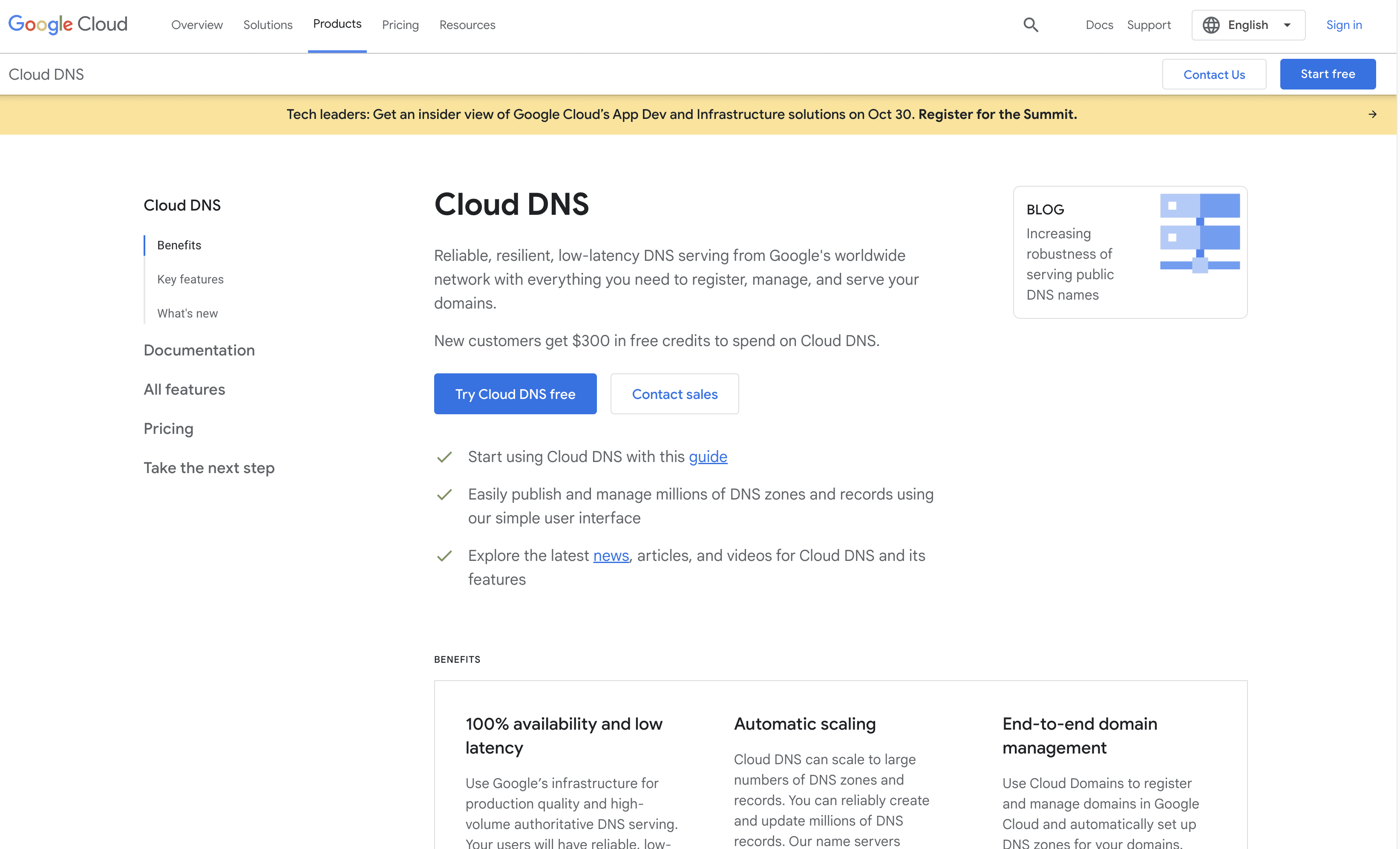
Google Cloud DNS is a reliable and low-latency DNS service leveraging Google's global network. It offers seamless domain management, automatic scaling, and integration with other Google Cloud services. Designed for ease of use, it provides a cost-effective solution for managing DNS records efficiently.
Google Cloud DNS Pricing
Cloud DNS pricing details can be found here.
Domain registration pricing starts at $12.
Google Cloud DNS Reviews
Google Cloud DNS has an overall rating of 4.6 out of 5 stars based on 37 reviews. Users praise its reliability and ease of use but note that costs can be confusing. Check out more of our reviews here!
Pros and Cons of Google Cloud DNS
Pros:
100% availability and low latency ensure reliable and fast access from anywhere in the world.
Automatic scaling handles large numbers of DNS zones and records, managing query volume effortlessly.
End-to-end domain management simplifies domain registration and management with tight integration with Cloud Domains.
Cons:
Cost can be a concern for some users, despite claims of cost-effectiveness.
Managing a large number of DNS zones and records may require expertise and familiarity with Google Cloud services.
Dependency on Google Cloud ties users to its ecosystem, which might not suit those seeking multi-cloud solutions.
4. SafeDNS
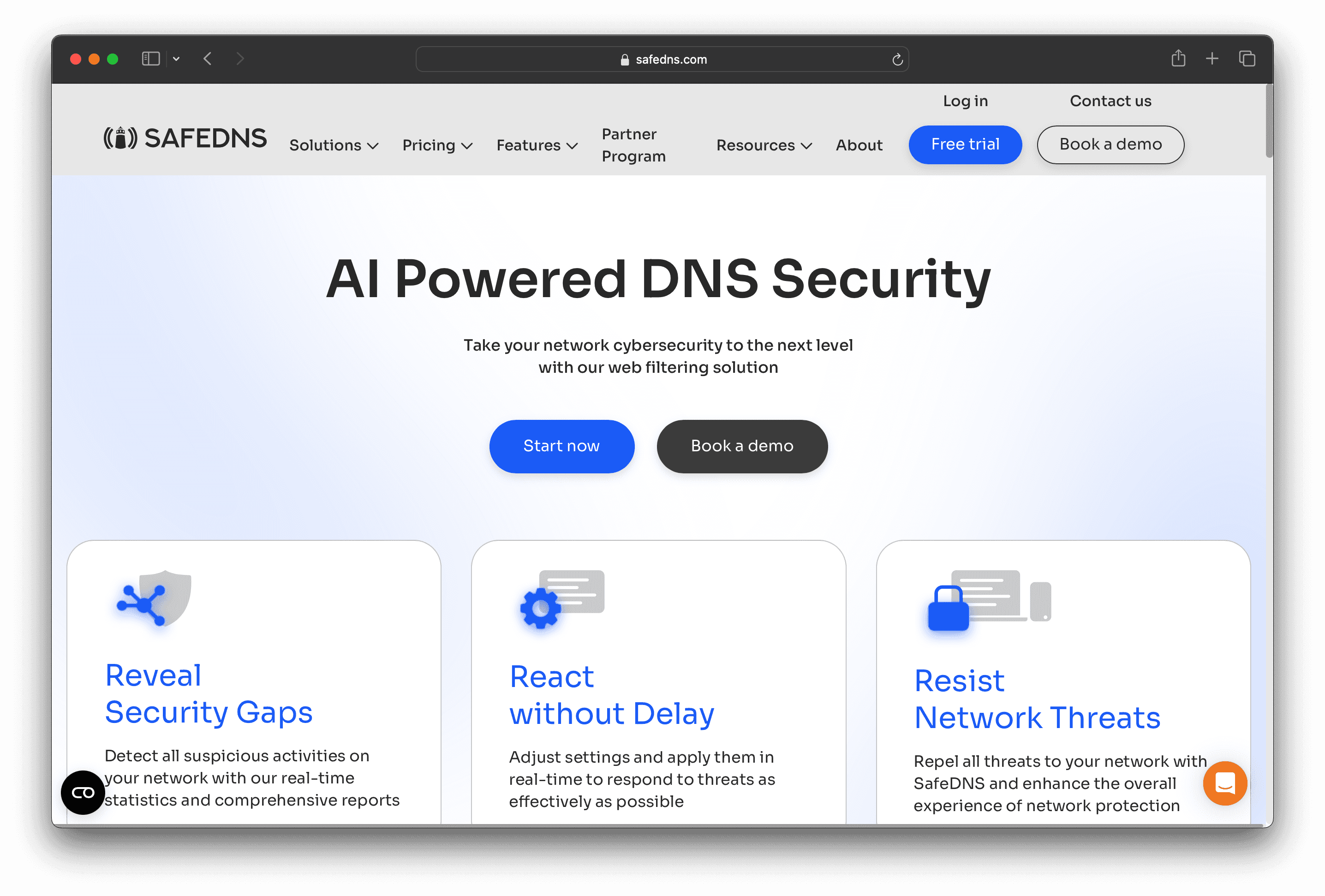
SafeDNS is a cloud-based DNS filtering solution designed to enhance network security by blocking malicious websites and filtering web content. Utilizing AI and machine learning, it offers easy deployment and management, making it accessible for users without specialized IT knowledge. SafeDNS aims to protect against online threats like phishing and malware.
SafeDNS Pricing
Safe Home: $25.95 per year, $39.95 for 2 years
Safe Family: $35.95 per year, $55.95 for 2 years
Business and Enterprise: Contact support for pricing
SafeDNS Reviews
SafeDNS has an overall rating of 4.7 out of 5 stars based on 15 reviews. Users praise its simplicity and effectiveness. Check out more of our reviews here!
Pros and Cons of SafeDNS
Pros:
Effective Content Filtering: Utilizes AI and machine learning to filter inappropriate content across 66 categories, ensuring comprehensive protection.
Instant Filtering Deployment: Quick and easy setup with zero cost implementation and free tech support, making it accessible for all users.
Phishing & Malware Protection: Advanced detection mechanisms block threats before they reach the device, enhancing overall security.
Cons:
Whitelist Management: Some users find managing whitelists challenging, which can complicate the user experience.
Interface Speed: The interface can sometimes be slow, potentially affecting productivity.
Lack of iOS Agent: Users wish for an iOS agent option, limiting the service's versatility across devices.
5. Gcore DNS
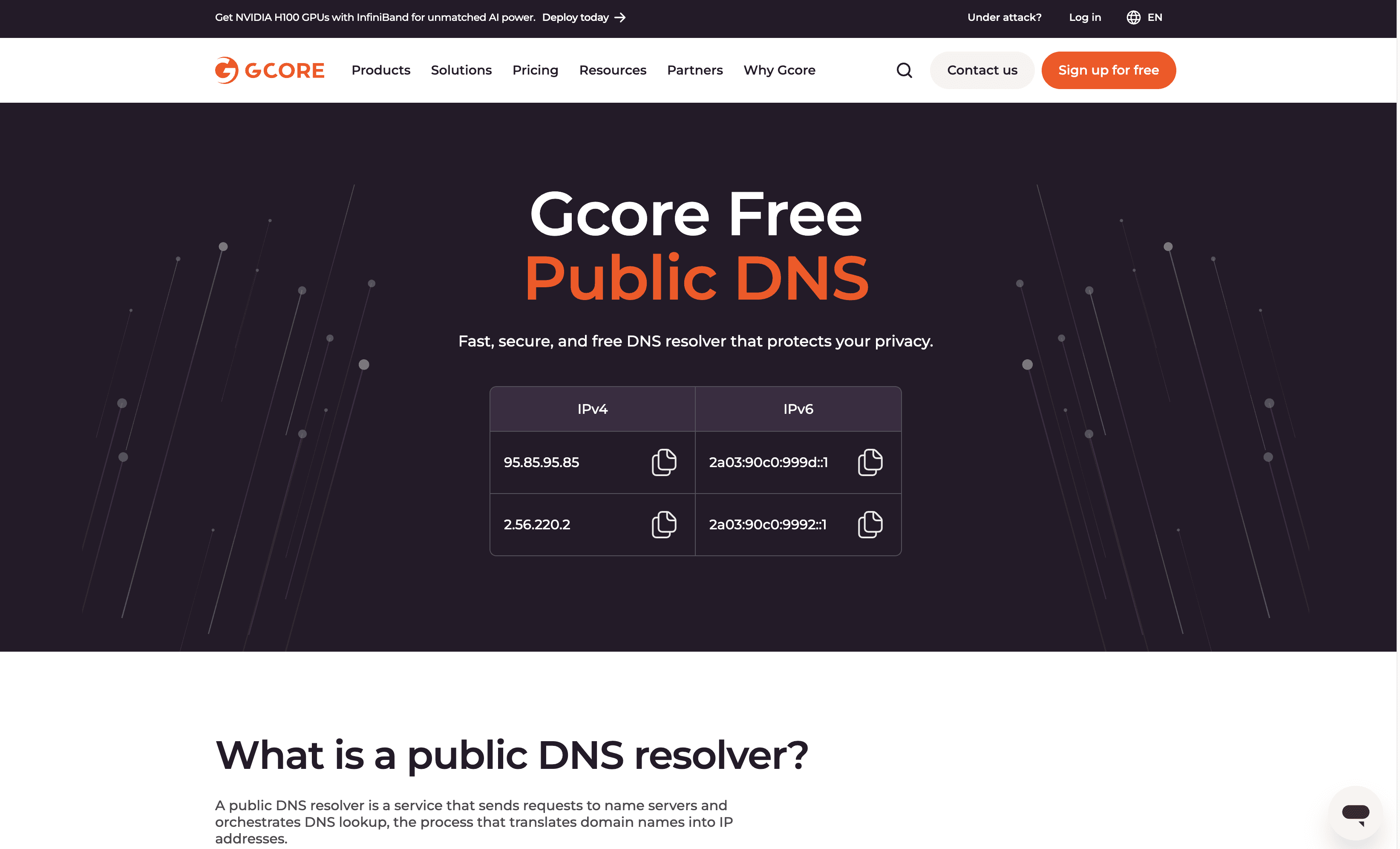
Gcore DNS is a free public DNS service designed to provide fast, secure, and private internet browsing. Leveraging Gcore's global network, it offers robust protection against DDoS attacks and ensures user privacy. Easy to set up, it aims to enhance online security for all users.
Gcore DNS Pricing
Gcore DNS's pricing is not public. Contact their support for more info.
Gcore DNS Reviews
Gcore DNS has an overall rating of 4.3 out of 5 stars based on 13 reviews. Users appreciate its fast loading times and global network. Check out more of our reviews here!
Pros and Cons of Gcore DNS
Pros:
Fast Response Times: Gcore DNS offers quick query responses, particularly in Europe, South America, and Africa, ensuring a smooth browsing experience.
High Privacy Standards: Anonymized query logs and secure storage in a Luxembourg Tier IV data center protect user privacy.
DDoS Resilience: The global Anycast network with 180+ nodes provides robust protection against DDoS attacks, enhancing security.
Cons:
Performance Variability: Users may experience inconsistent performance based on their specific location or network conditions.
Limited Features: Some users find the feature set lacking compared to other DNS services, which may limit functionality.
Cost Concerns: Although free, some users feel the paid plans are expensive relative to competitors, impacting budget decisions.
6. DNS Filter
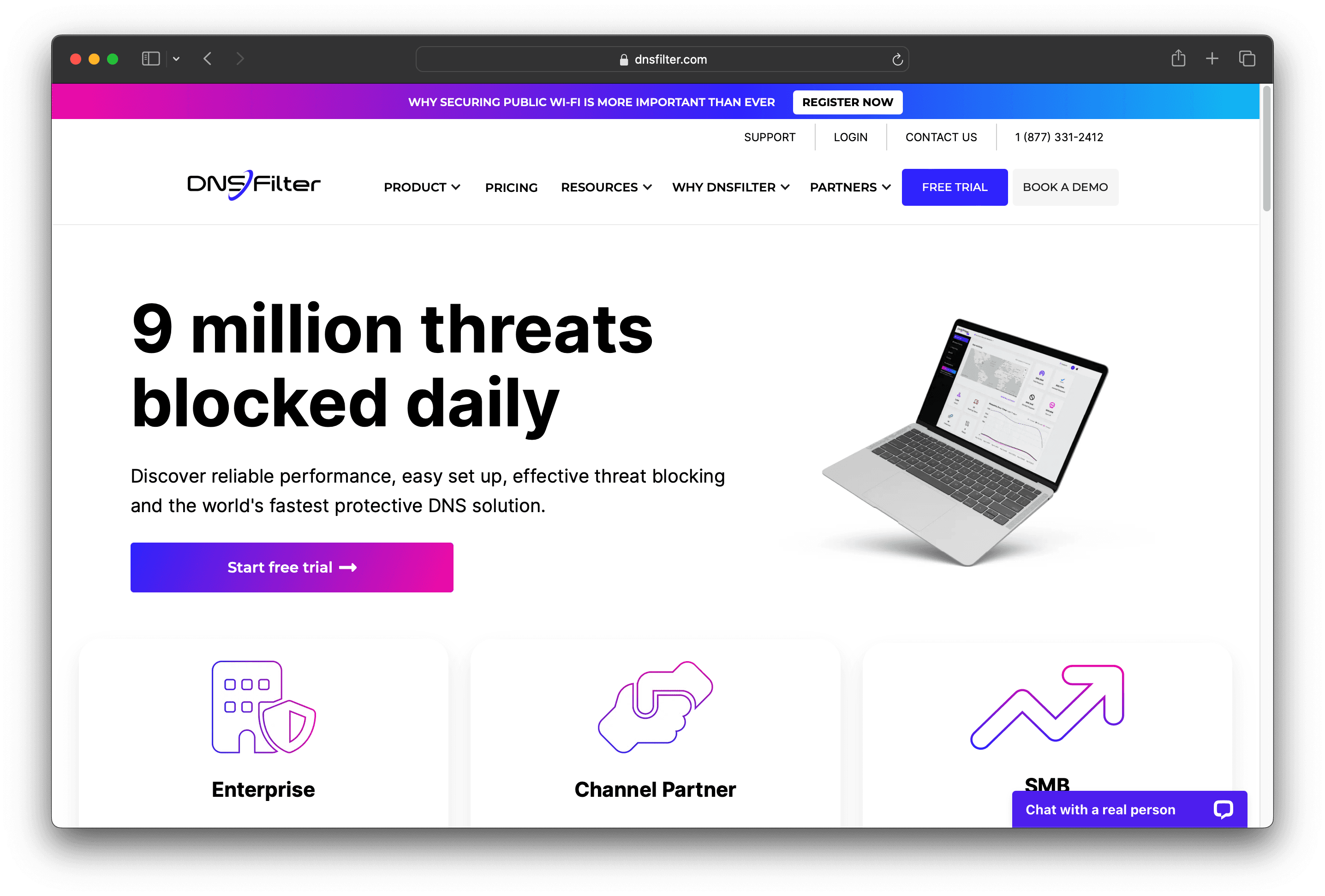
DNSFilter is a DNS filtering and security solution designed to protect against online threats and block unwanted content. It offers real-time threat detection, easy deployment, and comprehensive reporting, making it suitable for businesses, educational institutions, and managed service providers.
DNS Filter Pricing
BASIC: $0.90 per user per month
PRO: $1.80 per user per month
ENTERPRISE: $2.70 per user per month
MSP: Starts at $150 per month
Public Wi-Fi: Starts at $0.25 per user per month or $1.25 per access point per month
Education: Starts at $4 per year for each student and staff member (125 user minimum)
DNS Filter Reviews
DNSFilter has an overall rating of 4.6 out of 5 stars based on 237 reviews. Users appreciate its ease of deployment and effective threat blocking. Check out more of our reviews here!
Pros and Cons of DNS Filter
Pros:
DNSFilter is easy to deploy and administer, making it accessible for users with varying technical expertise.
Effective threat protection against phishing and malware ensures a safer browsing experience.
Detailed reporting provides valuable insights, helping administrators make informed decisions.
Cons:
Lack of DNS-over-HTTPS (DoH) support is a significant drawback for some users.
Issues with VPN compatibility can disrupt the user experience, particularly for remote workers.
Occasional misclassification of sites may lead to unintended access restrictions.
7. F5 BIG-IP DNS
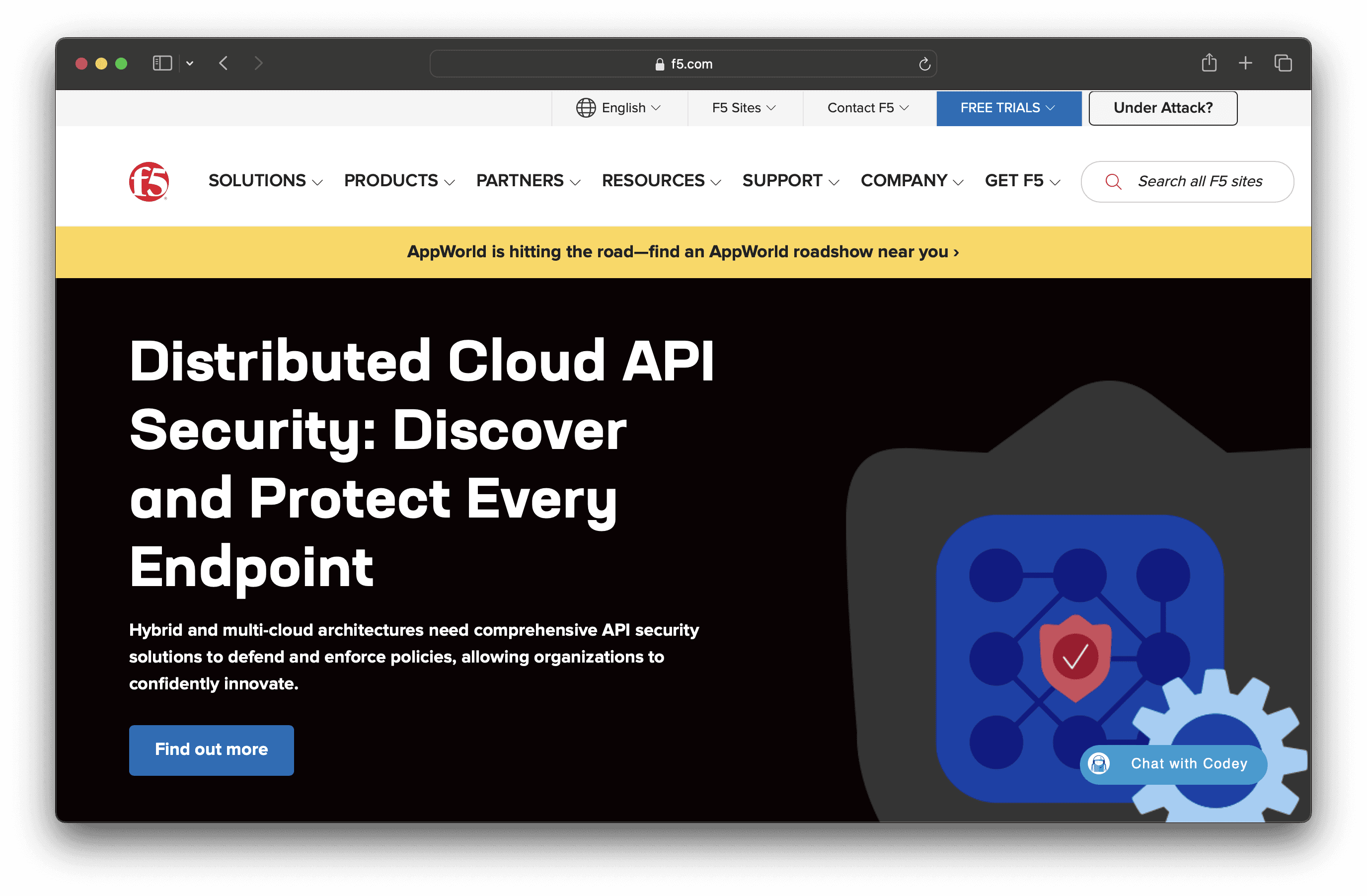
F5 BIG-IP DNS is a robust DNS solution designed to hyperscale and secure DNS infrastructure. It manages high query volumes and protects against DDoS attacks, ensuring reliable and fast connections. With easy deployment and integration capabilities, it aims to enhance DNS performance and security for businesses of all sizes.
F5 BIG-IP DNS Pricing
F5 BIG-IP DNS's pricing is not public. Contact their support for more info.
F5 BIG-IP DNS Reviews
F5 BIG-IP DNS has an overall rating of 4.2 out of 5 stars based on 11 reviews. Users appreciate its scalability and integration capabilities. Check out more of our reviews here!
Pros and Cons of F5 BIG-IP DNS
Pros:
High Performance: Hyperscales up to 100 million responses per second, ensuring rapid query handling.
On-Demand Scaling: Easily deploy on-demand scaling with rate limit and object limit capacity.
Global Performance: Directs users to the fastest, most reliable servers based on various factors.
Cons:
Complexity: Extensive feature set may require a steep learning curve for new users.
Cost: Advanced security features may come at a premium price, impacting smaller organizations.
Integration Requirements: Significant efforts may be needed to integrate with existing infrastructure.
8. Sophos
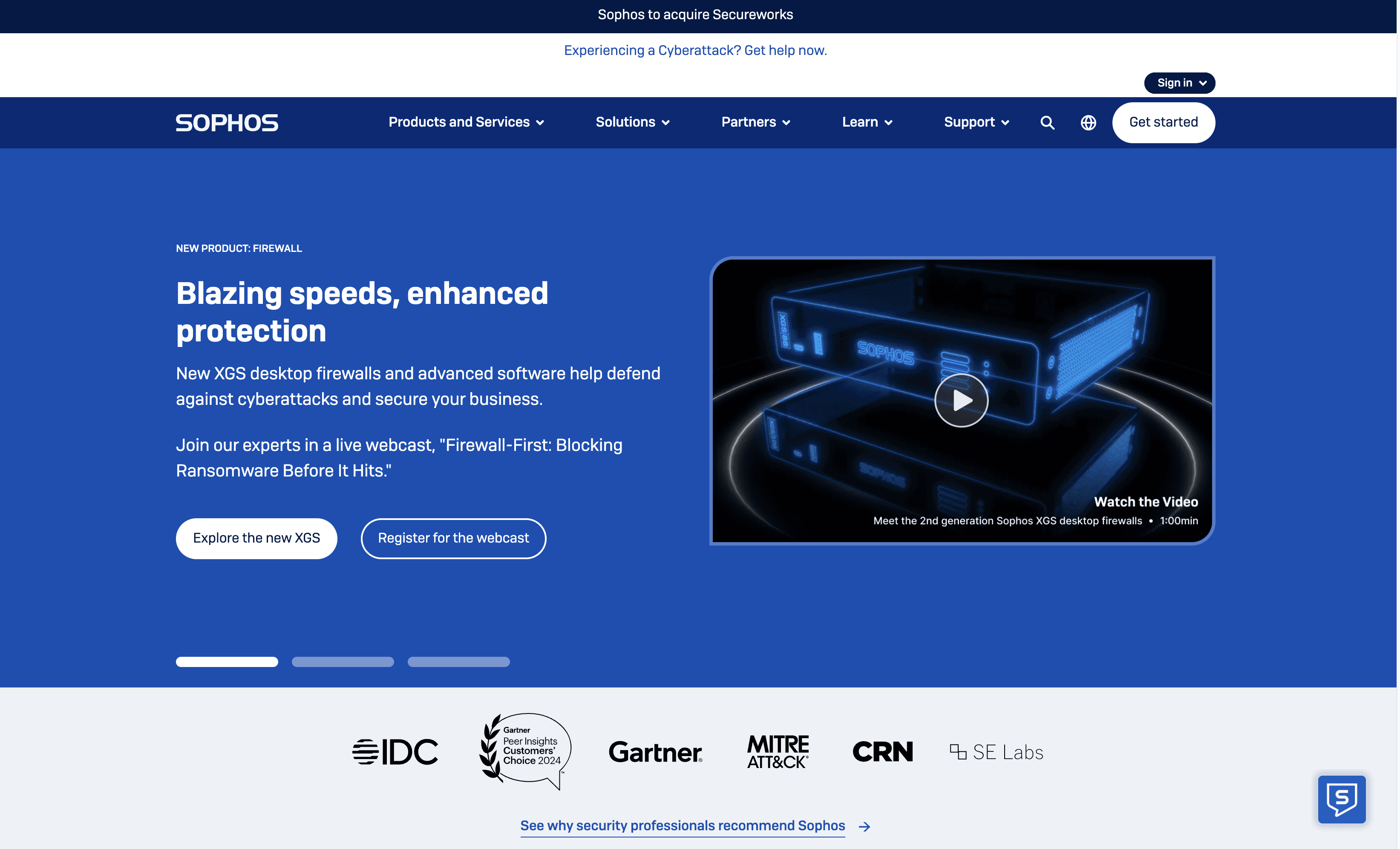
Sophos is a cybersecurity solution offering comprehensive protection across endpoints, networks, and cloud environments. It features centralized management through Sophos Central, making it easy to deploy and manage. With AI-powered threat detection and managed security services, Sophos aims to simplify and enhance cybersecurity for businesses of all sizes.
Sophos Pricing
Endpoint security
Network security
Email security
Cloud security
Managed security services
Sophos's pricing is not public. Contact their support for more info.
Sophos Reviews
Sophos has an overall rating of 4.6 out of 5 stars based on 334 reviews. Users praise its robust security features and ease of use. Check out more of our reviews here!
Pros and Cons of Sophos
Pros:
Comprehensive Security: Sophos offers a wide range of security solutions, including endpoint, network, email, and cloud security, ensuring all-encompassing protection.
Centralized Management: Sophos Central provides a unified platform for managing security across various environments, simplifying administration.
Advanced Threat Detection: Utilizes AI and human intelligence for effective threat detection and response, enhancing overall security.
Cons:
Complexity for Small Businesses: The extensive product range might be overwhelming for small businesses without dedicated IT staff.
Cost: Advanced security solutions and managed services can be expensive, potentially limiting accessibility for smaller organizations.
Integration Challenges: Setting up and managing third-party integrations may require significant effort and expertise.
9. NordLayer DNS Filtering
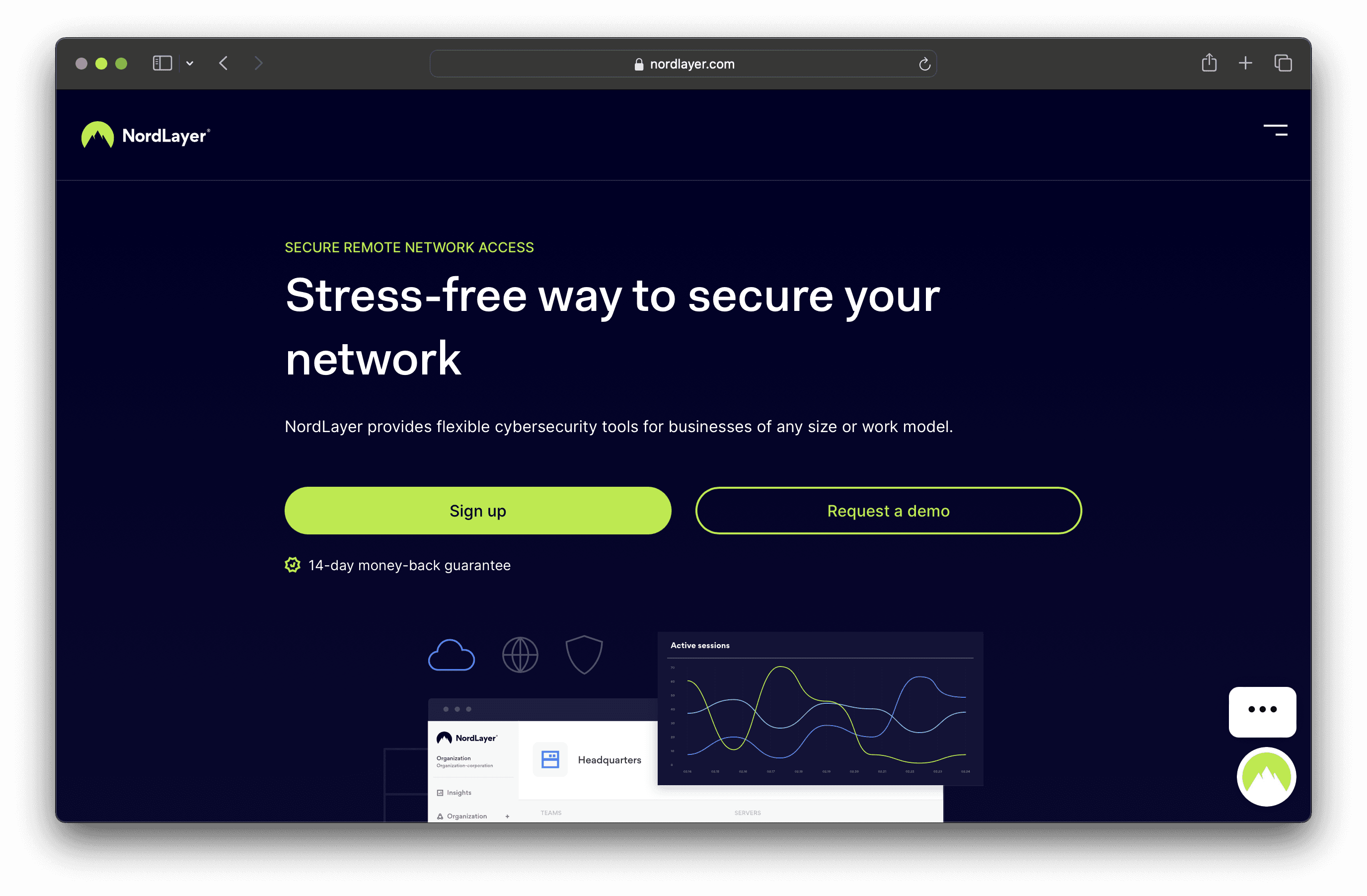
NordLayer DNS filtering is a cybersecurity solution designed to secure internet access by blocking malicious content and enabling encryption. It offers a simplified setup, high-speed servers, and comprehensive network access control, making it suitable for businesses of all sizes seeking robust online protection.
NordLayer DNS Filtering Pricing
Lite: $8 per user/month
Core: $11 per user/month
Premium: $14 per user/month
Enterprise: Custom pricing starting from $7 per user/month
NordLayer DNS Filtering Reviews
NordLayer DNS Filtering has an overall rating of 4.3 out of 5 stars based on 117 reviews. Users appreciate its simplicity and ease of use. Check out more of our reviews here!
Pros and Cons of NordLayer DNS Filtering
Pros:
Ease of Use: NordLayer's intuitive interface ensures that even non-technical users can navigate and configure settings with minimal effort.
High-Speed Servers: The service leverages high-speed servers to maintain fast and reliable internet access, minimizing latency.
Comprehensive Security: Integrated with features like ThreatBlock and encryption, NordLayer offers robust protection against various online threats.
Cons:
Performance Issues: Some users report occasional slowdowns, particularly during peak usage times, which can affect productivity.
Connection Issues: Dependence on a stable internet connection means that any network instability can disrupt service.
Complexity for Non-Technical Users: Despite its ease of use, initial setup and configuration may still pose challenges for those without technical expertise.
10. Zscaler DNS Security
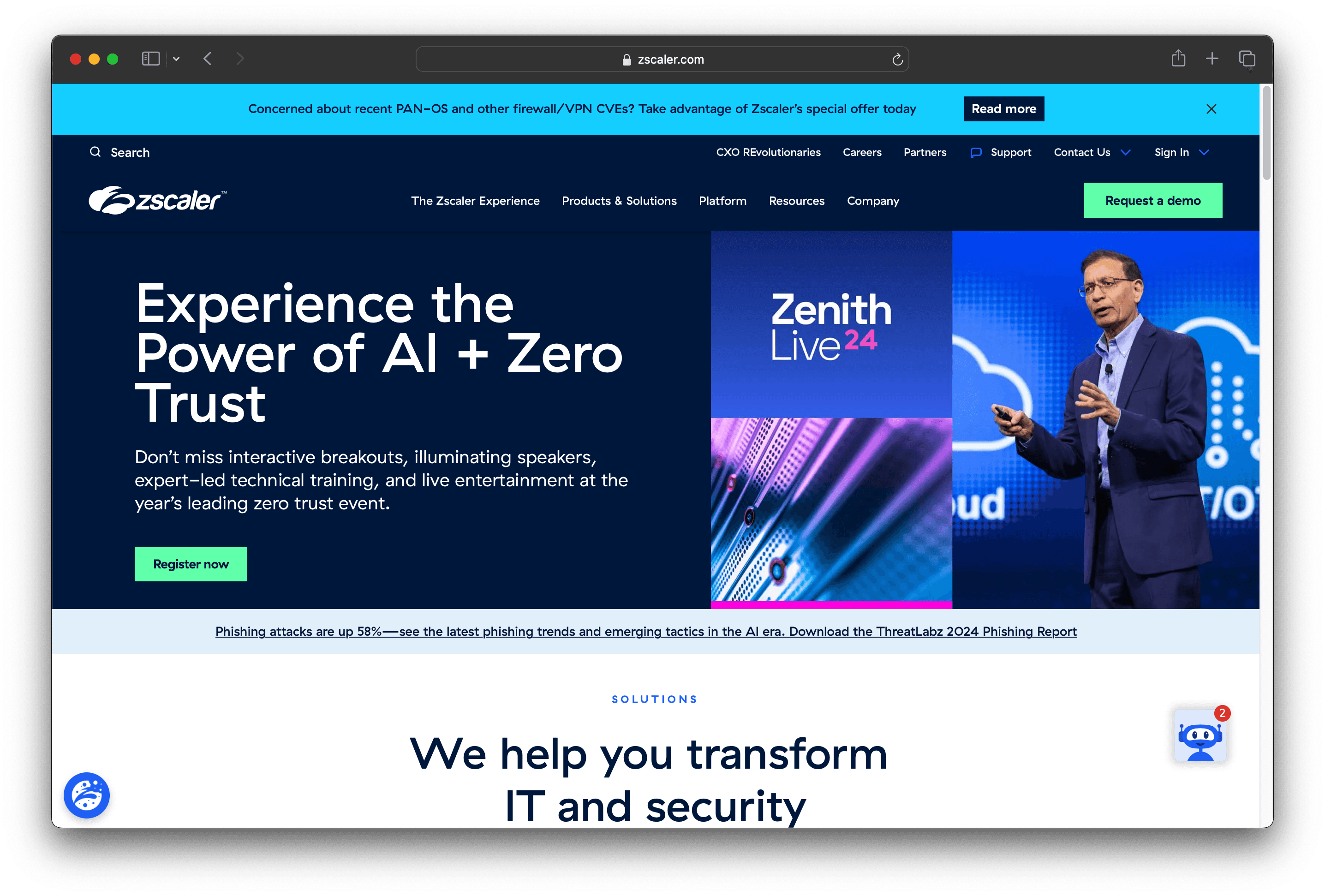
Zscaler DNS Security is a cloud-based solution designed to protect users from online threats by blocking malicious content and enabling secure internet access. With a focus on ease of deployment and comprehensive threat protection, Zscaler aims to enhance security for businesses of all sizes.
Zscaler DNS Security Pricing
Zscaler DNS Security's pricing is not public. Contact their support for more info.
Zscaler DNS Security Reviews
Zscaler DNS Security has an overall rating of 4.3 out of 5 stars based on 99 reviews. Users appreciate its comprehensive cloud security and ease of use. Check out more of our reviews here!
Pros and Cons of Zscaler DNS Security
Pros:
Seamless, Secure Access: Provides users with seamless, secure, and reliable access to applications and data.
Zero Trust Connectivity: Ensures zero trust connectivity for IoT and OT devices, and secure remote access to OT systems.
Comprehensive Protection: Offers a holistic approach to securing users, workloads, and devices.
Cons:
Complexity in Deployment: The comprehensive nature of the platform may require significant effort and expertise to deploy and manage effectively.
Dependence on Internet Connectivity: As a cloud-based solution, it relies heavily on internet connectivity, which could be a limitation in environments with poor or unstable internet access.
Potential for Overhead Costs: While it reduces firewall and infrastructure costs, there may be overhead costs associated with managing and maintaining the platform.
Looking to secure your technical infrastructure?
Twingate offers granular access controls and deployment automations to protect your VPC environment. By leveraging Zero Trust security tools, Twingate ensures that private resources and internet traffic remain secure in the modern world of work. Try Twingate for Free today!
Rapidly implement a modern Zero Trust network that is more secure and maintainable than VPNs.
The Best 10 Alternatives to NextDNS (+ Pricing & Reviews)
Twingate Team
•
Jul 10, 2024

NextDNS is a modern firewall solution that protects users from security threats, blocks ads and trackers, and provides parental controls across all devices and networks. While it offers robust features, it may not be suitable for everyone due to its technical setup requirements. This article explores how Twingate enhances secure access for distributed workforces.

10 Alternatives to NextDNS
1. Twingate

Twingate is a network security solution designed to replace traditional VPNs for remote access, offering a zero-trust security model and seamless deployment alongside existing infrastructure. With a focus on ease of use and scalability, Twingate aims to provide a secure and maintainable solution for businesses of all sizes.
Twingate Pricing
Starter: Free per user/month
Teams: $6 per user/month (monthly), $5 per user/month (yearly)
Business: $12 per user/month (monthly), $10 per user/month (yearly)
Enterprise: Custom pricing per user/month
Twingate Reviews
Twingate has an overall rating of 4.7 out of 5 stars based on 63 reviews. Users praise its ease of setup and high security. Check out more of our reviews here!
Pros and Cons of Twingate
Pros:
Seamless integration with existing infrastructure, making it easy to deploy without disrupting current systems.
Zero trust security model ensures that every access request is verified, enhancing overall security.
Highly rated for ease of setup, allowing teams to get started quickly without extensive technical knowledge.
Cons:
Some users report performance issues, particularly in high-traffic environments, which can affect productivity.
Limited customization options may not meet the specific needs of all organizations.
Logging issues have been noted, making it difficult to track and audit access requests effectively.
2. Webroot

Webroot is a cybersecurity solution designed to protect against malware, phishing, and other online threats. It offers real-time protection, cloud-based management, and easy deployment. With a focus on both home and business users, Webroot aims to provide comprehensive security with minimal impact on system performance.
Webroot Pricing
Business Endpoint Protection: 5 Seats: $150.00, 25 Seats: $690.00, 50+ Seats: Request a quote
DNS Protection: 5 Seats: $150.00, 25 Seats: $690.00, 50+ Seats: Request a quote
Security Awareness Training: 5 Seats: $150.00, 25 Seats: $690.00, 50+ Seats: Request a quote
MSPs and Resellers: Custom pricing available upon request
Education and Nonprofit Organizations: Custom pricing available upon request
State and Government Organizations: Custom pricing available upon request
Webroot Reviews
Webroot has an overall rating of 4.4 out of 5 stars based on 86 reviews. Users praise its ease of use and comprehensive security. Check out more of our reviews here!
Pros and Cons ofWebroot
Pros:
Easy to use and feature-rich console, making it accessible for users with varying technical expertise.
Quick and easy interface with minimal impact on endpoint performance, ensuring smooth operation.
Effective in blocking malicious traffic and malware at the DNS layer, enhancing overall security.
Cons:
Higher cost compared to competitors like Cisco Umbrella, which may be a concern for budget-conscious users.
Configuration can be complicated initially, requiring a learning curve for new users.
Occasional instability causing endpoints to lose internet access, potentially disrupting workflow.
3. Google Cloud DNS

Google Cloud DNS is a reliable and low-latency DNS service leveraging Google's global network. It offers seamless domain management, automatic scaling, and integration with other Google Cloud services. Designed for ease of use, it provides a cost-effective solution for managing DNS records efficiently.
Google Cloud DNS Pricing
Cloud DNS pricing details can be found here.
Domain registration pricing starts at $12.
Google Cloud DNS Reviews
Google Cloud DNS has an overall rating of 4.6 out of 5 stars based on 37 reviews. Users praise its reliability and ease of use but note that costs can be confusing. Check out more of our reviews here!
Pros and Cons of Google Cloud DNS
Pros:
100% availability and low latency ensure reliable and fast access from anywhere in the world.
Automatic scaling handles large numbers of DNS zones and records, managing query volume effortlessly.
End-to-end domain management simplifies domain registration and management with tight integration with Cloud Domains.
Cons:
Cost can be a concern for some users, despite claims of cost-effectiveness.
Managing a large number of DNS zones and records may require expertise and familiarity with Google Cloud services.
Dependency on Google Cloud ties users to its ecosystem, which might not suit those seeking multi-cloud solutions.
4. SafeDNS

SafeDNS is a cloud-based DNS filtering solution designed to enhance network security by blocking malicious websites and filtering web content. Utilizing AI and machine learning, it offers easy deployment and management, making it accessible for users without specialized IT knowledge. SafeDNS aims to protect against online threats like phishing and malware.
SafeDNS Pricing
Safe Home: $25.95 per year, $39.95 for 2 years
Safe Family: $35.95 per year, $55.95 for 2 years
Business and Enterprise: Contact support for pricing
SafeDNS Reviews
SafeDNS has an overall rating of 4.7 out of 5 stars based on 15 reviews. Users praise its simplicity and effectiveness. Check out more of our reviews here!
Pros and Cons of SafeDNS
Pros:
Effective Content Filtering: Utilizes AI and machine learning to filter inappropriate content across 66 categories, ensuring comprehensive protection.
Instant Filtering Deployment: Quick and easy setup with zero cost implementation and free tech support, making it accessible for all users.
Phishing & Malware Protection: Advanced detection mechanisms block threats before they reach the device, enhancing overall security.
Cons:
Whitelist Management: Some users find managing whitelists challenging, which can complicate the user experience.
Interface Speed: The interface can sometimes be slow, potentially affecting productivity.
Lack of iOS Agent: Users wish for an iOS agent option, limiting the service's versatility across devices.
5. Gcore DNS

Gcore DNS is a free public DNS service designed to provide fast, secure, and private internet browsing. Leveraging Gcore's global network, it offers robust protection against DDoS attacks and ensures user privacy. Easy to set up, it aims to enhance online security for all users.
Gcore DNS Pricing
Gcore DNS's pricing is not public. Contact their support for more info.
Gcore DNS Reviews
Gcore DNS has an overall rating of 4.3 out of 5 stars based on 13 reviews. Users appreciate its fast loading times and global network. Check out more of our reviews here!
Pros and Cons of Gcore DNS
Pros:
Fast Response Times: Gcore DNS offers quick query responses, particularly in Europe, South America, and Africa, ensuring a smooth browsing experience.
High Privacy Standards: Anonymized query logs and secure storage in a Luxembourg Tier IV data center protect user privacy.
DDoS Resilience: The global Anycast network with 180+ nodes provides robust protection against DDoS attacks, enhancing security.
Cons:
Performance Variability: Users may experience inconsistent performance based on their specific location or network conditions.
Limited Features: Some users find the feature set lacking compared to other DNS services, which may limit functionality.
Cost Concerns: Although free, some users feel the paid plans are expensive relative to competitors, impacting budget decisions.
6. DNS Filter

DNSFilter is a DNS filtering and security solution designed to protect against online threats and block unwanted content. It offers real-time threat detection, easy deployment, and comprehensive reporting, making it suitable for businesses, educational institutions, and managed service providers.
DNS Filter Pricing
BASIC: $0.90 per user per month
PRO: $1.80 per user per month
ENTERPRISE: $2.70 per user per month
MSP: Starts at $150 per month
Public Wi-Fi: Starts at $0.25 per user per month or $1.25 per access point per month
Education: Starts at $4 per year for each student and staff member (125 user minimum)
DNS Filter Reviews
DNSFilter has an overall rating of 4.6 out of 5 stars based on 237 reviews. Users appreciate its ease of deployment and effective threat blocking. Check out more of our reviews here!
Pros and Cons of DNS Filter
Pros:
DNSFilter is easy to deploy and administer, making it accessible for users with varying technical expertise.
Effective threat protection against phishing and malware ensures a safer browsing experience.
Detailed reporting provides valuable insights, helping administrators make informed decisions.
Cons:
Lack of DNS-over-HTTPS (DoH) support is a significant drawback for some users.
Issues with VPN compatibility can disrupt the user experience, particularly for remote workers.
Occasional misclassification of sites may lead to unintended access restrictions.
7. F5 BIG-IP DNS

F5 BIG-IP DNS is a robust DNS solution designed to hyperscale and secure DNS infrastructure. It manages high query volumes and protects against DDoS attacks, ensuring reliable and fast connections. With easy deployment and integration capabilities, it aims to enhance DNS performance and security for businesses of all sizes.
F5 BIG-IP DNS Pricing
F5 BIG-IP DNS's pricing is not public. Contact their support for more info.
F5 BIG-IP DNS Reviews
F5 BIG-IP DNS has an overall rating of 4.2 out of 5 stars based on 11 reviews. Users appreciate its scalability and integration capabilities. Check out more of our reviews here!
Pros and Cons of F5 BIG-IP DNS
Pros:
High Performance: Hyperscales up to 100 million responses per second, ensuring rapid query handling.
On-Demand Scaling: Easily deploy on-demand scaling with rate limit and object limit capacity.
Global Performance: Directs users to the fastest, most reliable servers based on various factors.
Cons:
Complexity: Extensive feature set may require a steep learning curve for new users.
Cost: Advanced security features may come at a premium price, impacting smaller organizations.
Integration Requirements: Significant efforts may be needed to integrate with existing infrastructure.
8. Sophos

Sophos is a cybersecurity solution offering comprehensive protection across endpoints, networks, and cloud environments. It features centralized management through Sophos Central, making it easy to deploy and manage. With AI-powered threat detection and managed security services, Sophos aims to simplify and enhance cybersecurity for businesses of all sizes.
Sophos Pricing
Endpoint security
Network security
Email security
Cloud security
Managed security services
Sophos's pricing is not public. Contact their support for more info.
Sophos Reviews
Sophos has an overall rating of 4.6 out of 5 stars based on 334 reviews. Users praise its robust security features and ease of use. Check out more of our reviews here!
Pros and Cons of Sophos
Pros:
Comprehensive Security: Sophos offers a wide range of security solutions, including endpoint, network, email, and cloud security, ensuring all-encompassing protection.
Centralized Management: Sophos Central provides a unified platform for managing security across various environments, simplifying administration.
Advanced Threat Detection: Utilizes AI and human intelligence for effective threat detection and response, enhancing overall security.
Cons:
Complexity for Small Businesses: The extensive product range might be overwhelming for small businesses without dedicated IT staff.
Cost: Advanced security solutions and managed services can be expensive, potentially limiting accessibility for smaller organizations.
Integration Challenges: Setting up and managing third-party integrations may require significant effort and expertise.
9. NordLayer DNS Filtering

NordLayer DNS filtering is a cybersecurity solution designed to secure internet access by blocking malicious content and enabling encryption. It offers a simplified setup, high-speed servers, and comprehensive network access control, making it suitable for businesses of all sizes seeking robust online protection.
NordLayer DNS Filtering Pricing
Lite: $8 per user/month
Core: $11 per user/month
Premium: $14 per user/month
Enterprise: Custom pricing starting from $7 per user/month
NordLayer DNS Filtering Reviews
NordLayer DNS Filtering has an overall rating of 4.3 out of 5 stars based on 117 reviews. Users appreciate its simplicity and ease of use. Check out more of our reviews here!
Pros and Cons of NordLayer DNS Filtering
Pros:
Ease of Use: NordLayer's intuitive interface ensures that even non-technical users can navigate and configure settings with minimal effort.
High-Speed Servers: The service leverages high-speed servers to maintain fast and reliable internet access, minimizing latency.
Comprehensive Security: Integrated with features like ThreatBlock and encryption, NordLayer offers robust protection against various online threats.
Cons:
Performance Issues: Some users report occasional slowdowns, particularly during peak usage times, which can affect productivity.
Connection Issues: Dependence on a stable internet connection means that any network instability can disrupt service.
Complexity for Non-Technical Users: Despite its ease of use, initial setup and configuration may still pose challenges for those without technical expertise.
10. Zscaler DNS Security

Zscaler DNS Security is a cloud-based solution designed to protect users from online threats by blocking malicious content and enabling secure internet access. With a focus on ease of deployment and comprehensive threat protection, Zscaler aims to enhance security for businesses of all sizes.
Zscaler DNS Security Pricing
Zscaler DNS Security's pricing is not public. Contact their support for more info.
Zscaler DNS Security Reviews
Zscaler DNS Security has an overall rating of 4.3 out of 5 stars based on 99 reviews. Users appreciate its comprehensive cloud security and ease of use. Check out more of our reviews here!
Pros and Cons of Zscaler DNS Security
Pros:
Seamless, Secure Access: Provides users with seamless, secure, and reliable access to applications and data.
Zero Trust Connectivity: Ensures zero trust connectivity for IoT and OT devices, and secure remote access to OT systems.
Comprehensive Protection: Offers a holistic approach to securing users, workloads, and devices.
Cons:
Complexity in Deployment: The comprehensive nature of the platform may require significant effort and expertise to deploy and manage effectively.
Dependence on Internet Connectivity: As a cloud-based solution, it relies heavily on internet connectivity, which could be a limitation in environments with poor or unstable internet access.
Potential for Overhead Costs: While it reduces firewall and infrastructure costs, there may be overhead costs associated with managing and maintaining the platform.
Looking to secure your technical infrastructure?
Twingate offers granular access controls and deployment automations to protect your VPC environment. By leveraging Zero Trust security tools, Twingate ensures that private resources and internet traffic remain secure in the modern world of work. Try Twingate for Free today!
Rapidly implement a modern Zero Trust network that is more secure and maintainable than VPNs.
The Best 10 Alternatives to NextDNS (+ Pricing & Reviews)
Twingate Team
•
Jul 10, 2024

NextDNS is a modern firewall solution that protects users from security threats, blocks ads and trackers, and provides parental controls across all devices and networks. While it offers robust features, it may not be suitable for everyone due to its technical setup requirements. This article explores how Twingate enhances secure access for distributed workforces.

10 Alternatives to NextDNS
1. Twingate

Twingate is a network security solution designed to replace traditional VPNs for remote access, offering a zero-trust security model and seamless deployment alongside existing infrastructure. With a focus on ease of use and scalability, Twingate aims to provide a secure and maintainable solution for businesses of all sizes.
Twingate Pricing
Starter: Free per user/month
Teams: $6 per user/month (monthly), $5 per user/month (yearly)
Business: $12 per user/month (monthly), $10 per user/month (yearly)
Enterprise: Custom pricing per user/month
Twingate Reviews
Twingate has an overall rating of 4.7 out of 5 stars based on 63 reviews. Users praise its ease of setup and high security. Check out more of our reviews here!
Pros and Cons of Twingate
Pros:
Seamless integration with existing infrastructure, making it easy to deploy without disrupting current systems.
Zero trust security model ensures that every access request is verified, enhancing overall security.
Highly rated for ease of setup, allowing teams to get started quickly without extensive technical knowledge.
Cons:
Some users report performance issues, particularly in high-traffic environments, which can affect productivity.
Limited customization options may not meet the specific needs of all organizations.
Logging issues have been noted, making it difficult to track and audit access requests effectively.
2. Webroot

Webroot is a cybersecurity solution designed to protect against malware, phishing, and other online threats. It offers real-time protection, cloud-based management, and easy deployment. With a focus on both home and business users, Webroot aims to provide comprehensive security with minimal impact on system performance.
Webroot Pricing
Business Endpoint Protection: 5 Seats: $150.00, 25 Seats: $690.00, 50+ Seats: Request a quote
DNS Protection: 5 Seats: $150.00, 25 Seats: $690.00, 50+ Seats: Request a quote
Security Awareness Training: 5 Seats: $150.00, 25 Seats: $690.00, 50+ Seats: Request a quote
MSPs and Resellers: Custom pricing available upon request
Education and Nonprofit Organizations: Custom pricing available upon request
State and Government Organizations: Custom pricing available upon request
Webroot Reviews
Webroot has an overall rating of 4.4 out of 5 stars based on 86 reviews. Users praise its ease of use and comprehensive security. Check out more of our reviews here!
Pros and Cons ofWebroot
Pros:
Easy to use and feature-rich console, making it accessible for users with varying technical expertise.
Quick and easy interface with minimal impact on endpoint performance, ensuring smooth operation.
Effective in blocking malicious traffic and malware at the DNS layer, enhancing overall security.
Cons:
Higher cost compared to competitors like Cisco Umbrella, which may be a concern for budget-conscious users.
Configuration can be complicated initially, requiring a learning curve for new users.
Occasional instability causing endpoints to lose internet access, potentially disrupting workflow.
3. Google Cloud DNS

Google Cloud DNS is a reliable and low-latency DNS service leveraging Google's global network. It offers seamless domain management, automatic scaling, and integration with other Google Cloud services. Designed for ease of use, it provides a cost-effective solution for managing DNS records efficiently.
Google Cloud DNS Pricing
Cloud DNS pricing details can be found here.
Domain registration pricing starts at $12.
Google Cloud DNS Reviews
Google Cloud DNS has an overall rating of 4.6 out of 5 stars based on 37 reviews. Users praise its reliability and ease of use but note that costs can be confusing. Check out more of our reviews here!
Pros and Cons of Google Cloud DNS
Pros:
100% availability and low latency ensure reliable and fast access from anywhere in the world.
Automatic scaling handles large numbers of DNS zones and records, managing query volume effortlessly.
End-to-end domain management simplifies domain registration and management with tight integration with Cloud Domains.
Cons:
Cost can be a concern for some users, despite claims of cost-effectiveness.
Managing a large number of DNS zones and records may require expertise and familiarity with Google Cloud services.
Dependency on Google Cloud ties users to its ecosystem, which might not suit those seeking multi-cloud solutions.
4. SafeDNS

SafeDNS is a cloud-based DNS filtering solution designed to enhance network security by blocking malicious websites and filtering web content. Utilizing AI and machine learning, it offers easy deployment and management, making it accessible for users without specialized IT knowledge. SafeDNS aims to protect against online threats like phishing and malware.
SafeDNS Pricing
Safe Home: $25.95 per year, $39.95 for 2 years
Safe Family: $35.95 per year, $55.95 for 2 years
Business and Enterprise: Contact support for pricing
SafeDNS Reviews
SafeDNS has an overall rating of 4.7 out of 5 stars based on 15 reviews. Users praise its simplicity and effectiveness. Check out more of our reviews here!
Pros and Cons of SafeDNS
Pros:
Effective Content Filtering: Utilizes AI and machine learning to filter inappropriate content across 66 categories, ensuring comprehensive protection.
Instant Filtering Deployment: Quick and easy setup with zero cost implementation and free tech support, making it accessible for all users.
Phishing & Malware Protection: Advanced detection mechanisms block threats before they reach the device, enhancing overall security.
Cons:
Whitelist Management: Some users find managing whitelists challenging, which can complicate the user experience.
Interface Speed: The interface can sometimes be slow, potentially affecting productivity.
Lack of iOS Agent: Users wish for an iOS agent option, limiting the service's versatility across devices.
5. Gcore DNS

Gcore DNS is a free public DNS service designed to provide fast, secure, and private internet browsing. Leveraging Gcore's global network, it offers robust protection against DDoS attacks and ensures user privacy. Easy to set up, it aims to enhance online security for all users.
Gcore DNS Pricing
Gcore DNS's pricing is not public. Contact their support for more info.
Gcore DNS Reviews
Gcore DNS has an overall rating of 4.3 out of 5 stars based on 13 reviews. Users appreciate its fast loading times and global network. Check out more of our reviews here!
Pros and Cons of Gcore DNS
Pros:
Fast Response Times: Gcore DNS offers quick query responses, particularly in Europe, South America, and Africa, ensuring a smooth browsing experience.
High Privacy Standards: Anonymized query logs and secure storage in a Luxembourg Tier IV data center protect user privacy.
DDoS Resilience: The global Anycast network with 180+ nodes provides robust protection against DDoS attacks, enhancing security.
Cons:
Performance Variability: Users may experience inconsistent performance based on their specific location or network conditions.
Limited Features: Some users find the feature set lacking compared to other DNS services, which may limit functionality.
Cost Concerns: Although free, some users feel the paid plans are expensive relative to competitors, impacting budget decisions.
6. DNS Filter

DNSFilter is a DNS filtering and security solution designed to protect against online threats and block unwanted content. It offers real-time threat detection, easy deployment, and comprehensive reporting, making it suitable for businesses, educational institutions, and managed service providers.
DNS Filter Pricing
BASIC: $0.90 per user per month
PRO: $1.80 per user per month
ENTERPRISE: $2.70 per user per month
MSP: Starts at $150 per month
Public Wi-Fi: Starts at $0.25 per user per month or $1.25 per access point per month
Education: Starts at $4 per year for each student and staff member (125 user minimum)
DNS Filter Reviews
DNSFilter has an overall rating of 4.6 out of 5 stars based on 237 reviews. Users appreciate its ease of deployment and effective threat blocking. Check out more of our reviews here!
Pros and Cons of DNS Filter
Pros:
DNSFilter is easy to deploy and administer, making it accessible for users with varying technical expertise.
Effective threat protection against phishing and malware ensures a safer browsing experience.
Detailed reporting provides valuable insights, helping administrators make informed decisions.
Cons:
Lack of DNS-over-HTTPS (DoH) support is a significant drawback for some users.
Issues with VPN compatibility can disrupt the user experience, particularly for remote workers.
Occasional misclassification of sites may lead to unintended access restrictions.
7. F5 BIG-IP DNS

F5 BIG-IP DNS is a robust DNS solution designed to hyperscale and secure DNS infrastructure. It manages high query volumes and protects against DDoS attacks, ensuring reliable and fast connections. With easy deployment and integration capabilities, it aims to enhance DNS performance and security for businesses of all sizes.
F5 BIG-IP DNS Pricing
F5 BIG-IP DNS's pricing is not public. Contact their support for more info.
F5 BIG-IP DNS Reviews
F5 BIG-IP DNS has an overall rating of 4.2 out of 5 stars based on 11 reviews. Users appreciate its scalability and integration capabilities. Check out more of our reviews here!
Pros and Cons of F5 BIG-IP DNS
Pros:
High Performance: Hyperscales up to 100 million responses per second, ensuring rapid query handling.
On-Demand Scaling: Easily deploy on-demand scaling with rate limit and object limit capacity.
Global Performance: Directs users to the fastest, most reliable servers based on various factors.
Cons:
Complexity: Extensive feature set may require a steep learning curve for new users.
Cost: Advanced security features may come at a premium price, impacting smaller organizations.
Integration Requirements: Significant efforts may be needed to integrate with existing infrastructure.
8. Sophos

Sophos is a cybersecurity solution offering comprehensive protection across endpoints, networks, and cloud environments. It features centralized management through Sophos Central, making it easy to deploy and manage. With AI-powered threat detection and managed security services, Sophos aims to simplify and enhance cybersecurity for businesses of all sizes.
Sophos Pricing
Endpoint security
Network security
Email security
Cloud security
Managed security services
Sophos's pricing is not public. Contact their support for more info.
Sophos Reviews
Sophos has an overall rating of 4.6 out of 5 stars based on 334 reviews. Users praise its robust security features and ease of use. Check out more of our reviews here!
Pros and Cons of Sophos
Pros:
Comprehensive Security: Sophos offers a wide range of security solutions, including endpoint, network, email, and cloud security, ensuring all-encompassing protection.
Centralized Management: Sophos Central provides a unified platform for managing security across various environments, simplifying administration.
Advanced Threat Detection: Utilizes AI and human intelligence for effective threat detection and response, enhancing overall security.
Cons:
Complexity for Small Businesses: The extensive product range might be overwhelming for small businesses without dedicated IT staff.
Cost: Advanced security solutions and managed services can be expensive, potentially limiting accessibility for smaller organizations.
Integration Challenges: Setting up and managing third-party integrations may require significant effort and expertise.
9. NordLayer DNS Filtering

NordLayer DNS filtering is a cybersecurity solution designed to secure internet access by blocking malicious content and enabling encryption. It offers a simplified setup, high-speed servers, and comprehensive network access control, making it suitable for businesses of all sizes seeking robust online protection.
NordLayer DNS Filtering Pricing
Lite: $8 per user/month
Core: $11 per user/month
Premium: $14 per user/month
Enterprise: Custom pricing starting from $7 per user/month
NordLayer DNS Filtering Reviews
NordLayer DNS Filtering has an overall rating of 4.3 out of 5 stars based on 117 reviews. Users appreciate its simplicity and ease of use. Check out more of our reviews here!
Pros and Cons of NordLayer DNS Filtering
Pros:
Ease of Use: NordLayer's intuitive interface ensures that even non-technical users can navigate and configure settings with minimal effort.
High-Speed Servers: The service leverages high-speed servers to maintain fast and reliable internet access, minimizing latency.
Comprehensive Security: Integrated with features like ThreatBlock and encryption, NordLayer offers robust protection against various online threats.
Cons:
Performance Issues: Some users report occasional slowdowns, particularly during peak usage times, which can affect productivity.
Connection Issues: Dependence on a stable internet connection means that any network instability can disrupt service.
Complexity for Non-Technical Users: Despite its ease of use, initial setup and configuration may still pose challenges for those without technical expertise.
10. Zscaler DNS Security

Zscaler DNS Security is a cloud-based solution designed to protect users from online threats by blocking malicious content and enabling secure internet access. With a focus on ease of deployment and comprehensive threat protection, Zscaler aims to enhance security for businesses of all sizes.
Zscaler DNS Security Pricing
Zscaler DNS Security's pricing is not public. Contact their support for more info.
Zscaler DNS Security Reviews
Zscaler DNS Security has an overall rating of 4.3 out of 5 stars based on 99 reviews. Users appreciate its comprehensive cloud security and ease of use. Check out more of our reviews here!
Pros and Cons of Zscaler DNS Security
Pros:
Seamless, Secure Access: Provides users with seamless, secure, and reliable access to applications and data.
Zero Trust Connectivity: Ensures zero trust connectivity for IoT and OT devices, and secure remote access to OT systems.
Comprehensive Protection: Offers a holistic approach to securing users, workloads, and devices.
Cons:
Complexity in Deployment: The comprehensive nature of the platform may require significant effort and expertise to deploy and manage effectively.
Dependence on Internet Connectivity: As a cloud-based solution, it relies heavily on internet connectivity, which could be a limitation in environments with poor or unstable internet access.
Potential for Overhead Costs: While it reduces firewall and infrastructure costs, there may be overhead costs associated with managing and maintaining the platform.
Looking to secure your technical infrastructure?
Twingate offers granular access controls and deployment automations to protect your VPC environment. By leveraging Zero Trust security tools, Twingate ensures that private resources and internet traffic remain secure in the modern world of work. Try Twingate for Free today!
Solutions
Solutions
The VPN replacement your workforce will love.
Solutions